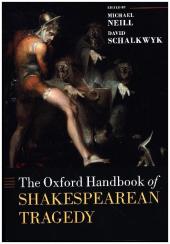 Neuerscheinungen 2018Stand: 2020-02-01 |
Schnellsuche
ISBN/Stichwort/Autor
|
Herderstra▀e 10
10625 Berlin
Tel.: 030 315 714 16
Fax 030 315 714 14
info@buchspektrum.de |

Michael Neill, David Schalkwyk
(Beteiligte)
The Oxford Handbook of Shakespearean Tragedy
Herausgegeben von Neill, Michael; Schalkwyk, David
2018. 992 S. 244 mm
Verlag/Jahr: OXFORD UNIVERSITY PRESS 2018
ISBN: 0-19-882039-9 (0198820399)
Neue ISBN: 978-0-19-882039-0 (9780198820390)
Preis und Lieferzeit: Bitte klicken
The Oxford Handbook of Shakespearean Tragedy brings together fifty-four essays by scholars from all parts of the world. It offers a fresh and comprehensive understanding of Shakespeare tragedies as both works of literature and as performance texts, written by a playwright who was himself an experienced actor.
The Oxford Handbook of Shakespearean Tragedy presents fifty-four essays by a range of scholars from all parts of the world. Together these essays offer readers a fresh and comprehensive understanding of Shakespeare tragedies as both works of literature and as performance texts written by a playwright who was himself an experienced actor. The opening section explores ways in which later generations of critics have shaped our idea of ┤Shakespearean┤ tragedy,
and addresses questions of genre by examining the playwright┤s inheritance from the classical and medieval past. The second section is devoted to current textual issues, while the third offers new critical readings of each of the tragedies. This is set beside a group of essays that deal with performance
history, with screen productions, and with versions devised for the operatic stage, as well as with twentieth and twenty-first century re-workings of Shakespearean tragedy. The book┤s final section expands readers┤ awareness of Shakespeare┤s global reach, tracing histories of criticism and performance across Europe, the Americas, Australasia, the Middle East, Africa, India, and East Asia.
an enormous volume ... What I particularly appreciate about this collection is the editors┤ commitment to accommodating a range of approaches to tragedy. Kevin Curran, Studies in English Literature 1500-1900


